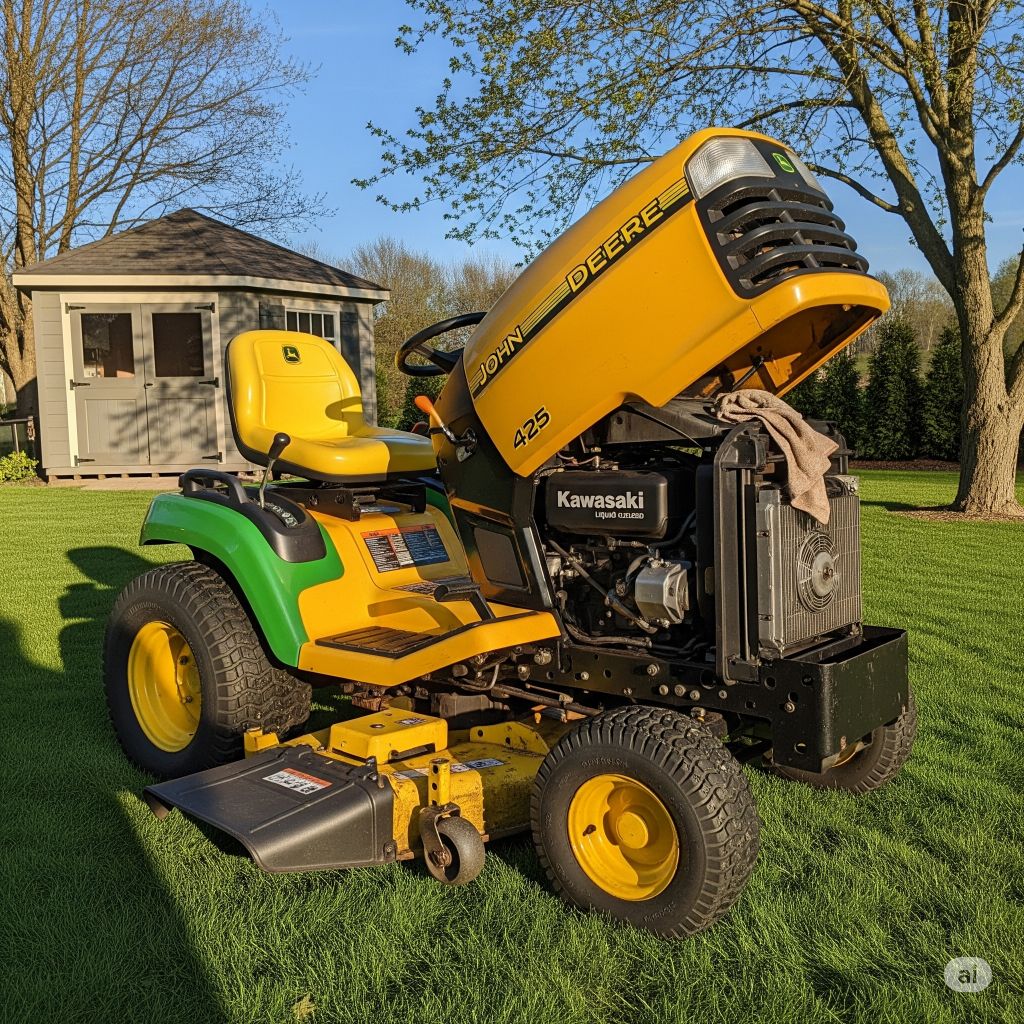
The John Deere 425 is a premium lawn and garden tractor that delivers power, reliability, and versatility for homeowners and professionals alike. With a powerful Kawasaki engine and robust hydraulic capabilities, it handles everything from mowing and tilling to heavy-duty yard work. Whether equipped with a front-end loader or a snowblower, the 425 is a true workhorse.
But even great machines have their weak points. Owners of the 425 have reported issues over the years ranging from starting problems to PTO failure, electrical glitches, and fuel delivery malfunctions. This guide dives deep into the common problems, practical fixes, technical specifications, and FAQs, helping you keep your John Deere 425 running smoothly.
🔧 Common John Deere 425 Problems and Fixes
1. Starting Problems
Symptoms: Engine won’t crank or cranks slowly.
Likely Causes:
- Faulty spark plugs
- Weak or dead battery
- Corroded or loose battery terminals
- Ignition switch failure
Fixes:
- Replace spark plugs with NGK BPR4ES or equivalent.
- Test battery voltage (should be >12.6V); recharge or replace if weak.
- Clean battery terminals using a wire brush and ensure tight connections.
- Test the ignition switch and starter relay using a multimeter.
👉 Pro Tip: Keep dielectric grease on battery terminals to prevent corrosion.
2. Performance Issues
Symptoms: Reduced power during mowing, slow throttle response, engine bogging.
Likely Causes:
- Clogged air or fuel filter
- Dirty carburetor
- Vacuum leaks or throttle linkage problems
Fixes:
- Replace the air filter regularly, especially in dusty environments.
- Clean or replace the fuel filter located under the chassis.
- Remove and clean the carburetor using carburetor cleaner.
- Inspect vacuum hoses for cracks and replace if damaged.
3. Electrical Problems
Symptoms: Lights not working, starter not engaging, dead dash panel.
Likely Causes:
- Blown fuses or faulty relays
- Dirty ground connections
- Wiring damage due to rodents or corrosion
Fixes:
- Locate and inspect fuses behind the dash panel. Replace blown fuses.
- Clean all frame ground points.
- Check the harness for any exposed or broken wires.
- Test continuity with a multimeter from ignition switch to solenoid.
4. PTO (Power Take-Off) Malfunctions
Symptoms: Mower deck or attachments don’t spin or engage inconsistently.
Likely Causes:
- Faulty electric PTO clutch
- Low voltage to the clutch
- Bad PTO switch
Fixes:
- Measure clutch coil resistance (should be ~2–3 ohms). Replace if out of spec.
- Check PTO switch continuity with ignition on.
- Inspect voltage at clutch connector; anything below 12V could cause weak engagement.
- Replace the electric PTO clutch if worn or burned.
5. Fuel Pump Issues
Symptoms: Engine stalls randomly or won’t start after sitting.
Likely Causes:
- Failed fuel pump or fuel pump relay
- Clogged fuel lines
- Dirty fuel tank
Fixes:
- Replace the electric fuel pump if no pressure is detected.
- Test and replace the relay near the engine firewall.
- Clean out the tank and fuel lines, and flush any gunk.
- Use only fresh, ethanol-free gas when possible.
6. Hydraulic System Issues
Symptoms: Slow or jerky response from loader or lift arms.
Specs to Know:
- Hydraulic flow: 4.65 GPM
- Pressure: Rated at 1000 PSI
Likely Causes:
- Low or dirty hydraulic fluid
- Blocked hydraulic lines
- Faulty control valve
Fixes:
- Check and refill hydraulic fluid using recommended Hy-Gard or equivalent.
- Clean the inline hydraulic filter.
- Inspect hoses for kinks or leaks.
- Replace worn-out control valves or lever linkages if responsiveness is inconsistent.
⚙️ John Deere 425 Specifications
| Category | Details |
|---|---|
| Engine | Kawasaki FD620D, 2-cylinder, liquid-cooled |
| Horsepower | 20 HP |
| Fuel Capacity | 6.5 gallons |
| Transmission | Hydrostatic (Twin Touch foot controls) |
| PTO | Independent, electric clutch |
| Hydraulics | 1000 PSI, 4.65 GPM |
| Steering | Power steering |
| Weight | ~905 lbs (tractor only) |
| Tires | Front: 16×6.50-8, Rear: 23×10.50-12 |
| 3-Point Hitch | Optional (Cat 0 with kit) |
| Attachments | 54”/60” mower deck, snowblower, loader |
🧰 Maintenance Checklist
| Interval | Task |
|---|---|
| Every 25 hrs | Check engine oil, clean radiator screen |
| Every 50 hrs | Grease fittings, inspect mower deck |
| Every 100 hrs | Change engine oil & filter |
| Every 200 hrs | Change air filter, replace fuel filter |
| Every 500 hrs | Change hydro fluid and filter |
| Annually | Inspect PTO clutch, flush cooling system |
✅ Attachments and Capabilities
The John Deere 425 supports a wide variety of attachments for lawn and light commercial use:
- 60″ and 54″ mower decks
- 47″ or 54″ snow blower
- Quick attach front-end loader (JD 40 or 45)
- Rear tiller or blade (with optional hitch)
- Baggers, dethatchers, sprayers, and more
This makes it ideal for mowing, snow removal, garden prep, and landscaping.
👍 Pros and 👎 Cons
👍 Pros:
- Powerful and smooth Kawasaki liquid-cooled engine
- Excellent hydraulic power for loader and deck lift
- Comfortable ride with adjustable seat
- Easily modifiable with 3-point hitch and PTO add-ons
- Built like a tank — heavy frame and durable parts
👎 Cons:
- Aging electronics (wiring issues are common)
- PTO clutch failure can be expensive
- No factory 3-point hitch unless added later
- Kawasaki engine parts can be pricey
📋 FAQs About the John Deere 425
❓ Is the John Deere 425 a good tractor?
Yes. It’s considered one of the most durable garden tractors of its time, with strong hydraulics and great engine performance.
❓ What type of oil does a JD 425 use?
Use SAE 10W-30 for the engine and Hy-Gard for the transmission and hydraulics.
❓ Does it have power steering?
Yes, the John Deere 425 comes with factory-installed power steering.
❓ Can I add a 3-point hitch?
Yes, an aftermarket Category 0 hitch kit is available and supports light-duty 3-point implements.
❓ Why is my 425 mower deck not engaging?
Check the PTO switch, clutch coil resistance, and voltage at the connector. If clutch ohms are below 2, it’s time to replace it.
🛠️ Final Thoughts: Is the John Deere 425 Still Worth It?
The John Deere 425 remains a beloved classic in the lawn and garden world for good reason. With proper maintenance and a few modern upgrades, this tractor can last decades. It handles a wide range of tasks and attachments, and its power and hydraulic performance still rival modern machines.
While some PTO, starting, and electrical issues may crop up over time, most are easy to diagnose and fix using basic tools. If you’re considering buying or refurbishing a John Deere 425, it’s a solid investment — especially if you have hilly terrain, large yards, or seasonal snow.

I’m David man behind Lawn Mowerly; I’ve been dealing with lawnmowers and Tractors with my father since I was a kid. I know every make and model and what each one is capable of and love helping people find the perfect equipment for their needs.
